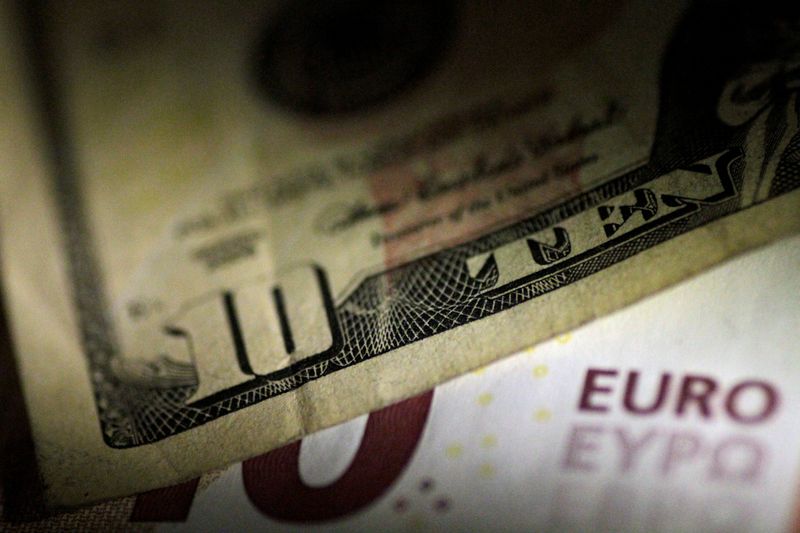Select Language

By Ankur Banerjee
SINGAPORE (Reuters) - The euro languished near a three week low on Thursday as traders intensified bets that the European Central Bank (ECB) will start cutting rates from March next year, while the dollar was steady ahead of a crucial payrolls data later this week.
The euro was up 0.05% at $1.0767, but remained close to lows of $1.07595 it touched on Wednesday. The single currency is down 1% this week and on course for the steepest weekly decline since May.
Traders are betting that there is around an 85% chance that the ECB cuts interest rates at the March meeting, with almost 150 basis points worth of easing priced by the end of next year.
The question of a rate cut could emerge in 2024, ECB member and Bank of France head Francois Villeroy de Galhau told a French paper in an interview published on Wednesday.
Villeroy told La Depeche du Midi that "disinflation is happening more quickly than we thought."
The ECB will set interest rates on Thursday next week and is all but certain to leave them at the current record high of 4%. The Federal Reserve and Bank of England are also likely to hold rates steady next Wednesday and Thursday respectively.
The dollar has found its footing this month after a 3% drop in November as traders ramp up rate cut bets for other central banks.
The dollar index, which measures the U.S. currency against six rivals, was little changed at 104.12, having risen 0.17% overnight. The index is up 0.9% this week, on course for its strongest weekly performance since July.
Data on Wednesday showed U.S. private payrolls increased less than expected in November, in yet another sign that the labour market is gradually cooling.
Investor focus will be on Friday's non-farm payrolls data for a clearer picture of the labour market.
"The various labour market statistics suggest the U.S. labour market is slowly loosening," said Carol Kong, a currency strategist at Commonwealth Bank of Australia (OTC:CMWAY).
"In our view, a sharp weakening of the labour market is needed for financial markets to price in a U.S. recession that we have long expected."
A recent string of softening economic data along with commentary from U.S. Federal Reserve officials have stoked expectations that the central bank is at the end of its rate-hike cycle and will begin to cut rates as soon as March.
Markets are pricing in a 60% chance of a rate cut in March, according to CME FedWatch tool, compared to 50% a week earlier. They are anticipating 125 basis points of cuts from the Fed next year.
Analysts though have cautioned that the markets have been too aggressive in pricing in rate cuts next year.
"The market is too aggressively priced for Fed rate cuts heading into 2024 and so we expect a correction in this pricing to deliver a stronger USD," said David Forrester, currency strategist at Credit Agricole (OTC:CRARY) CIB.
Meanwhile, the Bank of Canada on Wednesday held its key overnight rate at 5% and, in contrast to its peers, left the door open to another hike, saying it was still concerned about inflation while acknowledging an economic slowdown and a general easing of prices.
The Canadian dollar tacked on 0.01% versus the greenback to 1.36 per dollar.
Elsewhere, the Japanese yen strengthened 0.16% to 147.07 per dollar. The offshore Chinese yuan eased 0.02% to $7.1717 per dollar. The Australian dollar added 0.03% to $0.655.
In cryptocurrencies, bitcoin was 0.19% higher at $43,910.11.

